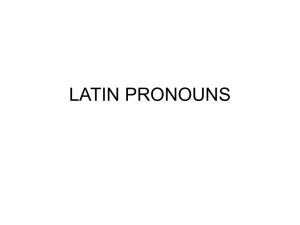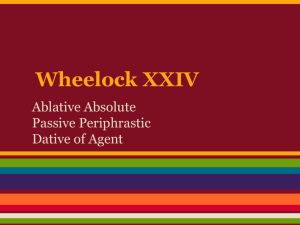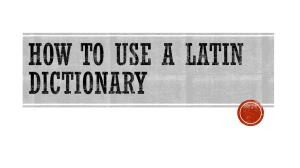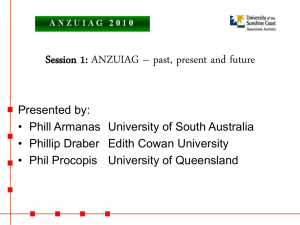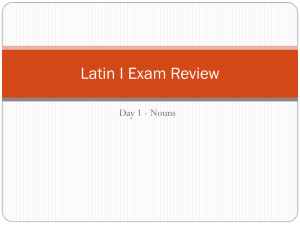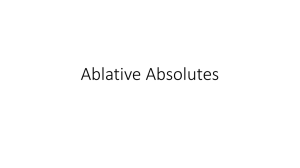bonus - linguae
advertisement
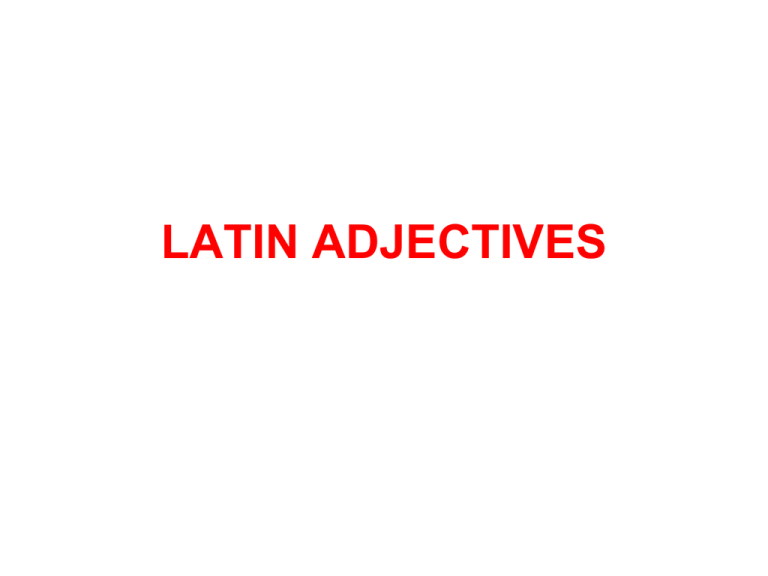
LATIN ADJECTIVES GENERAL PRINCIPLES • As in French, Latin adjectives can go before or after a noun. They more often go after the noun. • Also as in French, the forms of adjectives change depending on whether the noun is singular or plural and on its gender. • Latin is a little more complicated because – There are three genders – masculine, feminine and neuter – Adjectives also change according to the grammatical role of the noun it goes with – e.g. the endings are different when the noun is the subject of a verb from when it is the object ADJECTIVES IN -US, -A, -UM • These adjectives have masculine endings like servus, feminine ones like ancilla and neuter ones like tablīnum • So, the singular subject endings are: Masc –us, Fem -a, Neut -um and the singular object endings are: Masc -um, Fem -am, Neut -um: • Look at these examples with puer, leō, umbrivir , liber (masculine). puella, rēgīna (feminine) and computātrum (neuter) – Puer malus puellam bonam pulsat. The bad boy hits the good girl [the boy is subject as he does the hitting, the girl is object as he gets hit! ] – Rēgīna bona leōnem ignāvum spectat. The good queen looks at a lazy lion. [the queen is subject as she does the looking, the lion is object as he gets looked at; leōnem has –em for the object ending but ignāvum keeps –um as it is an –us, -a, -um adjective] – Computātrum insānum mē terret. The crazy computer frightens me [the computer is subject as it does the terrifying!] – Puella irāta computātrum stultum pulsat. An angry girl hits a stupid computer. [the girl does the hitting, the computer gets hit – notice the neuter keeps the same form whether it is subject or object] – Umbrivir insānus librum magnum tenet. A crazy gweilo is holding a big book. [the gweilo does the holding, the book gets held] ADJECTIVES IN -US, -A, -UM (PLURAL) • The plural subject endings are: Masc –ī, Fem -ae, Neut -a and the plural object endings are: Masc -ōs, Fem -ās, Neut -a: • Look at these sentences with the same nouns in the plural: – Puerī malī puellās bonās pulsant. The bad boys hit the good girls [the boys are subject as they do the hitting, the girls are object as they get hit! ] – Rēgīnae bonae leōnēs ignāvōs spectant. The good queens look at lazy lions. [the queens are subject as they do the looking, the lions are object as they get looked at; leōnēs has –ēs for the object ending but ignāvōs keeps –ōs as it is an –us, -a, -um adjective] – Computātra īnsāna mē terrent. The crazy computers frighten me [the computer is subject as it does the terrifying!] – Puellae īrātae computātra stulta pulsant. Angry girls hit stupid computers. [the girls do the hitting, the computers get hit – notice the neuter keeps the same form whether it is subject or object] – Umbrivirī insānī librōs magnōs tenent. Crazy gweilos are holding big books. [the gweilos do the holding, the books get held] THE –ER VARIATION • A few adjectives (like a few nouns in the 2nd. Declension) have a Masculine Nominative singular ending -er instead of –us: – miser (miserable, wretched) līber (free) – sacer (sacred) pulcher (beautiful) • All the other forms of such adjectives (i.e. the other masculine cases and all of the Feminine and Neuter ones) add the normal endings after the r, with the preceding e sometimes retained and sometimes dropped: – (keeping e): miser, misera, miserum – līber, lībera, līberum – (dropping e): sacer, sacra, sacrum – pulcher, pulchra, pulchrum Now answer each question and check your answer with the following slide • What form of bonus goes with a feminine plural object? • ? • What form of bonus goes with a feminine plural object? • bonās • What form of bonus goes with a masculine singular subject? • ? • What form of bonus goes with a masculine singular subject? • bonus • What form of bonus goes with a feminine singular subject? • ? • What form of bonus goes with a feminine singular subject? • bona • What form of bonus goes with a neuter singular subject? • ? • What form of bonus goes with a neuter singular subject? • bonum • What form of bonus goes with a masculine singular object? • ? • What form of bonus goes with a masculine singular object? • bonum • What form of bonus goes with a feminine singular object? • ? • What form of bonus goes with a feminine singular object? • bonam • What form of bonus goes with a neuter singular object? • ? • What form of bonus goes with a neuter singular object? • bonum • What form of bonus goes with a masculine plural subject? • ? • What form of bonus goes with a masculine plural subject? • bonī • What form of bonus goes with a feminine plural subject? • ? • What form of bonus goes with a feminine plural subject? • bonae • What form of bonus goes with a neuter plural subject? • ? • What form of bonus goes with a neuter plural subject? • bona • What form of bonus goes with a masculine plural object? • ? • What form of bonus goes with a masculine plural object? • bonōs • What form of bonus goes with a feminine plural object? • ? • What form of bonus goes with a feminine plural object? • bonās • What form of bonus goes with a neuter plural object? • ? • What form of bonus goes with a neuter plural object? • bona Now choose an adjective from the list to go in each of the blanks in the sentences • magnus (big), stultās (foolish), probae (honest), parva (small), īnsānōs (crazy), Graecī (Greek), album (white), mea (my) • • • • • • • • Puella ________ cēnam coquit. Leō _________ in hortō ambulat. (leō is masculine) Caecilius mercātōrēs _________ salūtat. (mercātōrēs, m.) Librum _______ in mēnsam pōnō. (liber, m.) Puerī ________ theātrum spectant. Pōcula ________ sunt in cubiculō. (pōculum, n.) Rēgīnās ________ nōn amāmus (rēgīnā = queen) Fēminae _________ Quīntum dēlectant. Now choose an adjective from the list to go in each of the blanks in the sentences • magnus (big), stultās (foolish), probae (honest), parva (small), īnsānōs (crazy), Graecī (Greek), album (white), mea (my) • • • • • • • • Puella __parva/mea__ cēnam coquit. Leō _________ in hortō ambulat. (leō is masculine) Caecilius mercātōrēs _________ salūtat. (mercātōrēs, m.) Librum _______ in mēnsam pōnō. (liber, m.) Puerī ________ theātrum spectant. Pōcula ________ sunt in cubiculō. (pōculum, n.) Rēgīnās ________ nōn amāmus (rēgīnā = queen) Fēminae _________ Quīntum dēlectant. Now choose an adjective from the list to go in each of the blanks in the sentences • magnus (big), stultās (foolish), probae (honest), parva (small), īnsānōs (crazy), Graecī (Greek), album (white), mea (my) • • • • • • • • Puella __parva/mea__ cēnam coquit. Leō ___magnus_ in hortō ambulat. (leō is masculine) Caecilius mercātōrēs _________ salūtat. (mercātōrēs, m.) Librum _______ in mēnsam pōnō. (liber, m.) Puerī ________ theātrum spectant. Pōcula ________ sunt in cubiculō. (pōculum, n.) Rēgīnās ________ nōn amāmus (rēgīnā = queen) Fēminae _________ Quīntum dēlectant. Now choose an adjective from the list to go in each of the blanks in the sentences • magnus (big), stultās (foolish), probae (honest), parva (small), īnsānōs (crazy), Graecī (Greek), album (white), mea (my) • • • • • • • • Puella __parva/mea__ cēnam coquit. Leō __magnus__ in hortō ambulat. (leō is masculine) Caecilius mercātōrēs _ īnsānōs _ salūtat. (mercātōrēs, m.) Librum _______ in mēnsam pōnō. (liber, m.) Puerī ________ theātrum spectant. Pōcula ________ sunt in cubiculō. (pōculum, n.) Rēgīnās ________ nōn amāmus (rēgīnā = queen) Fēminae _________ Quīntum dēlectant. Now choose an adjective from the list to go in each of the blanks in the sentences • magnus (big), stultās (foolish), probae (honest), parva (small), īnsānōs (crazy), Graecī (Greek), album (white), mea (my) • • • • • • • • Puella __ parva/mea _ cēnam coquit. Leō _ magnus _ in hortō ambulat. (leō is masculine) Caecilius mercātōrēs īnsānōs salūtat. (mercātōrēs, m.) Librum _album_ in mēnsam pōnō.. (liber, m.) Puerī ______ theātrum spectant. Pōcula _________ sunt in cubiculō (pōculum, n.) Rēgīnās ________ nōn amāmus (rēgīnā = queen) Fēminae _________ Quīntum dēlectant. Now choose an adjective from the list to go in each of the blanks in the sentences • magnus (big), stultās (foolish), probae (honest), parva (small), īnsānōs (crazy), Graecī (Greek), album (white), mea (my) • • • • • • • • Puella __ parva/mea _ cēnam coquit. Leō _ magnus _ in hortō ambulat. (leō is masculine) Caecilius mercātōrēs īnsānōs salūtat. (mercātōrēs, m.) Librum _album_ in mēnsam pōnō.. (liber, m.) Puerī _Graecī _ theātrum spectant. Pōcula _________ sunt in cubiculō (pōculum, n.) Rēgīnās _________ nōn amāmus (rēgīnā = queen) Fēminae __________ Quīntum dēlectant. Now choose an adjective from the list to go in each of the blanks in the sentences • magnus (big), stultās (foolish), probae (honest), parva (small), īnsānōs (crazy), Graecī (Greek), album (white), mea (my) • • • • • • • • Puella __ parva/mea _ cēnam coquit. Leō _ magnus _ in hortō ambulat. (leō is masculine) Caecilius mercātōrēs īnsānōs salūtat. (mercātōrēs, m.) Librum _album_ in mēnsam pōnō.. (liber, m.) Puerī _Graecī _ theātrum spectant. Pōcula _parva/mea_ sunt in cubiculō (pōculum, n.) Rēgīnās ________ nōn amāmus (rēgīnā = queen) Fēminae ________ Quīntum dēlectant. Now choose an adjective from the list to go in each of the blanks in the sentences • magnus (big), stultās (foolish), probae (honest), parva (small), īnsānōs (crazy), Graecī (Greek), album (white), mea (my) • • • • • • • • Puella __ parva/mea _ cēnam coquit. Leō _ magnus _ in hortō ambulat. (leō is masculine) Caecilius mercātōrēs īnsānōs salūtat. (mercātōrēs, m.) Librum _album_ in mēnsam pōnō.. (liber, m.) Puerī _Graecī _ theātrum spectant. Pōcula _parva/mea_ sunt in cubiculō (pōculum, n.) Rēgīnās _ stultās _ nōn amāmus (rēgīnā = queen) Fēminae __________ Quīntum dēlectant. Now choose an adjective from the list to go in each of the blanks in the sentences • magnus (big), stultās (foolish), probae (honest), parva (small), īnsānōs (crazy), Graecī (Greek), album (white), mea (my) • • • • • • • • Puella __ parva/mea _ cēnam coquit. Leō _ magnus _ in hortō ambulat. (leō is masculine) Caecilius mercātōrēs īnsānōs salūtat. (mercātōrēs, m.) Librum _album_ in mēnsam pōnō.. (liber, m.) Puerī _Graecī _ theātrum spectant. Pōcula _parva/mea_ sunt in cubiculō (pōculum, n.) Rēgīnās _ stultās _ nōn amāmus (rēgīnā = queen) Fēminae __probae_ Quīntum dēlectant. ADJECTIVES IN -US, -A, -UM GENITIVE, DATIVE, ABLATIVE • The singular Genitive (possessive) endings are: Masc –ī, Fem -ae, Neut -ī, the singular Dative (indirect object) endings are: Masc -ō, Fem -ae, Neuter –ō, and the singular Ablative endings: Masc -ō, Fem -ā, Neuter –ō • Look at these examples with puer, leō, umbrivir , liber (masculine). puella, rēgīna (feminine), computātrum (neuter) and amīcus (masculine) – Puer puellae bonae pecūniam dat. The boy gives the good girl money – Rēgīna leōnī ignāvō cibum dat. The queen gives food to a lazy lion. [the ending on ignāvō is not the same as on leōnī because the adjective and the noun belong to different declensions, but the gender and case are the same (masculine Dative singular). – Liber puerī īnsānī est in mēnsā. The crazy boy’s book is on the table – Ubi est computātrum puellae īrātae? Where is the angry girl’s computer? – Servus rēgīnae ignāvae librum rēgis probī tenet. The slave of the lazy queen is holding the honest king’s book. – Cum amīcō cārō ambulō. I am walking with a dear friend. ADJECTIVES IN -US, -A, -UM GENITIVE, DATIVE, ABLATIVE (PLURAL) • • The plural Genitive endings: Masc –ōrum, Fem -ārum, Neut - ōrum and the plural Dative and Ablative ending is -īs for all genders Look at these examples with puer, leō, umbrivir , liber (masculine). puella, rēgīna (feminine) and computātrum (neuter) – Puer puellīs bonīs pecūniam dat. The boy gives the good girls money – Rēgīna leōnibus ignāvīs cibum dat. The queen gives food to the lazy lions. [the ending on ignāvīs is not the same as on leōnibus because the adjective and the noun belong to different declensions, but the gender, number and case are the same (masculine dative plural). – Liberī puerōrum īnsānōrum sunt in mēnsā. The crazy boy’s books are on the table – Ubi sunt computātra puellārum īrātārum? Where are the angry girls’ computers? – Servī rēgīnārum ignāvārum librōs rēgum probōrum tenent. The slaves of the lazy queens are holding the honest kings’ books. – Amīcī mīlitum probōrum sunt in vīllā. The friends of the honest soldiers are in the villa. – Marcus cum puellīs pulchrīs lūdit. Marcus is playing with the beautiful girls Now choose an adjective from the list to go in each of the blanks in the sentences • magnīs (big), stultae (foolish), probōrum (honest), parvō (small), īnsānī (crazy), Graecō (Greek), albīs (white), meōrum (my) • Puellae ________ pecūniam nōn dō. • Leōnibus _________ nōn crēdimus. • Caecilius verba mercātōrum _________ audit. (mercātōr,, • • • • • m.) Fēlibus _______ aquam dare necesse est. Fābula dominī ________ mē minimē dēlectat Servō ________ ancilla nōn placet. Canī ________ cibum dedī (canis, m.) Vīdistīne librōs amīcorum _________ ? Now choose an adjective from the list to go in each of the blanks in the sentences • magnīs (big), stultae (foolish), probōrum (honest), parvō (small), īnsānī (crazy), Graecō (Greek), albīs (white), meōrum (my) • Puellae __stultae____ pecūniam nōn dō. • Leōnibus ______________________ nōn crēdimus. • Caecilius verba mercātōrum ______________________ audit. (mercātōr, m.) • Fēlibus _________________ aquam dare necesse est. • Fābula dominī _________ mē minimē dēlectat • Servō _________________ ancilla nōn placet. • Canī ___________________ cibum dedī (canis, m.) • Vīdistīne librōs amīcorum _______________________ ? Now choose an adjective from the list to go in each of the blanks in the sentences • magnīs (big), stultae (foolish), probōrum (honest), parvō (small), īnsānī (crazy), Graecō (Greek), albīs (white), meōrum (my) • Puellae __stultae____ pecūniam nōn dō. • Leōnibus __ magnīs/ albīs _______ nōn crēdimus. • Caecilius verba mercātōrum ______________________ audit. (mercātōr, m.) • Fēlibus _________________ aquam dare necesse est. • Fābula dominī _________ mē minimē dēlectat • Servō _________________ ancilla nōn placet. • Canī ___________________ cibum dedī (canis, m.) • Vīdistīne librōs amīcorum _______________________ ? Now choose an adjective from the list to go in each of the blanks in the sentences • magnīs (big), stultae (foolish), probōrum (honest), parvō (small), īnsānī (crazy), Graecō (Greek), albīs (white), meōrum (my) • Puellae __stultae____ pecūniam nōn dō. • Leōnibus __ magnīs/ albīs _______ nōn crēdimus. • Caecilius verba mercātōrum ___ probōrum/ meōrum _ audit. (mercātōr, m.) • Fēlibus _________________ aquam dare necesse est. • Fābula dominī _________ mē minimē dēlectat • Servō _________________ ancilla nōn placet. • Canī ___________________ cibum dedī (canis, m.) • Vīdistīne librōs amīcorum _______________________ ? Now choose an adjective from the list to go in each of the blanks in the sentences • magnīs (big), stultae (foolish), probōrum (honest), parvō (small), īnsānī (crazy), Graecō (Greek), albīs (white), meōrum (my) • Puellae __stultae____ pecūniam nōn dō. • Leōnibus __ magnīs/ albīs _______ nōn crēdimus. • Caecilius verba mercātōrum ___ probōrum/ meōrum _ audit. (mercātōr, m.) • Fēlibus __ magnīs/ albīs __ aquam dare necesse est. • Fābula dominī _________ mē minimē dēlectat • Servō _________________ ancilla nōn placet. • Canī ___________________ cibum dedī (canis, m.) • Vīdistīne librōs amīcorum _______________________ ? Now choose an adjective from the list to go in each of the blanks in the sentences • magnīs (big), stultae (foolish), probōrum (honest), parvō (small), īnsānī (crazy), Graecō (Greek), albīs (white), meōrum (my) • Puellae __stultae____ pecūniam nōn dō. • Leōnibus __ magnīs/ albīs _______ nōn crēdimus. • Caecilius verba mercātōrum ___ probōrum/ meōrum _ audit. (mercātōr, m.) • Fēlibus __ magnīs/ albīs __ aquam dare necesse est. • Fābula dominī __ īnsānī _ mē minimē dēlectat • Servō _________________ ancilla nōn placet. • Canī ___________________ cibum dedī (canis, m.) • Vīdistīne librōs amīcorum _______________________ ? Now choose an adjective from the list to go in each of the blanks in the sentences • magnīs (big), stultae (foolish), probōrum (honest), parvō (small), īnsānī (crazy), Graecō (Greek), albīs (white), meōrum (my) • Puellae __stultae____ pecūniam nōn dō. • Leōnibus __ magnīs/ albīs _______ nōn crēdimus. • Caecilius verba mercātōrum ___ probōrum/ meōrum _ audit. (mercātōr, m.) • Fēlibus __ magnīs/ albīs __ aquam dare necesse est. • Fābula dominī __ īnsānī _ mē minimē dēlectat • Servō __ parvō/ Graecō _ ancilla nōn placet. • Canī ___________________ cibum dedī (canis, m.) • Vīdistīne librōs amīcorum _______________________ ? Now choose an adjective from the list to go in each of the blanks in the sentences • magnīs (big), stultae (foolish), probōrum (honest), parvō (small), īnsānī (crazy), Graecō (Greek), albīs (white), meōrum (white) • Puellae __stultae____ pecūniam nōn dō. • Leōnibus __ magnīs/ albīs _______ nōn crēdimus. • Caecilius verba mercātōrum ___ probōrum/ meōrum _ audit. (mercātōr, m.) • Fēlibus __ magnīs/ albīs __ aquam dare necesse est. • Fābula dominī __ īnsānī _ mē minimē dēlectat • Servō __ parvō/ Graecō _ ancilla nōn placet. • Canī ___ parvō/ Graecō __ cibum dedī (canis, m.) • Vīdistīne librōs amīcorum _______________________ ? Now choose an adjective from the list to go in each of the blanks in the sentences • magnīs (big), stultae (foolish), probōrum (honest), parvō (small), īnsānī (crazy), Graecō (Greek), albīs (white), meōrum (my) • Puellae __stultae____ pecūniam nōn dō. • Leōnibus __ magnīs/ albīs _______ nōn crēdimus. • Caecilius verba mercātōrum ___ probōrum/ meōrum _ audit. (mercātōr, m.) • Fēlibus __ magnīs/ albīs __ aquam dare necesse est. • Fābula dominī __ īnsānī _ mē minimē dēlectat • Servō __ parvō/ Graecō _ ancilla nōn placet. • Canī ___ parvō/ Graecō __ cibum dedī (canis, m.) • Vīdistīne librōs amīcorum __ probōrum/ meōrum ___ ? THE FULL SET OF ENDINGS FOR BONUS - SINGULAR Masculine Nominative bonus Accusative Genitive Dative Ablative Feminine Neuter bona bonum THE FULL SET OF ENDINGS FOR BONUS - SINGULAR Masculine Feminine Neuter Nominative bonus bona bonum Accusative bonum bonam bonum Genitive Dative Ablative THE FULL SET OF ENDINGS FOR BONUS - SINGULAR Masculine Feminine Neuter Nominative bonus bona bonum Accusative bonum bonam bonum bonae bonī Genitive Dative Ablative bonī THE FULL SET OF ENDINGS FOR BONUS - SINGULAR Masculine Feminine Neuter Nominative bonus bona bonum Accusative bonum bonam bonum Genitive bonī bonae bonī Dative bonō bonae bonō Ablative THE FULL SET OF ENDINGS FOR BONUS - SINGULAR Masculine Feminine Neuter Nominative bonus bona bonum Accusative bonum bonam bonum Genitive bonī bonae bonī Dative bonō bonae bonō Ablative bonō bonā bonō THE FULL SET OF ENDINGS FOR BONUS - PLURAL Masculine Nominative bonī Accusative Genitive Dative Ablative Feminine Neuter bonae bona THE FULL SET OF ENDINGS FOR BONUS - PLURAL Masculine Feminine Neuter Nominative bonī bonae bona Accusative bonōs bonās bona Genitive Dative Ablative THE FULL SET OF ENDINGS FOR BONUS - PLURAL Masculine Feminine Neuter Nominative bonī bonae bona Accusative bonōs bonās bona bonārum bonōrum Genitive Dative Ablative bonōrum THE FULL SET OF ENDINGS FOR BONUS - PLURAL Masculine Feminine Neuter Nominative bonī bonae bona Accusative bonōs bonās bona Genitive bonōrum bonārum bonōrum Dative bonīs bonīs bonīs Ablative THE FULL SET OF ENDINGS FOR BONUS - PLURAL Masculine Feminine Neuter Nominative bonī bonae bona Accusative bonōs bonās bona Genitive bonōrum bonārum bonōrum Dative bonīs bonīs bonīs Ablative bonīs bonīs bonīs ADJECTIVES IN –IS, -E Nominative Accusative Genitive Dative Ablative M & F (Sing) Neut (Sing) M & F (Plr) Neut (Plr) omnis omnēs omnia omne ADJECTIVES IN –IS, -E M & F (Sing) Neut (Sing) M & F (Plr) Neut (Plr) Nominative omnis omne omnēs omnia Accusative omnem omne omnēs omnia Genitive Dative Ablative ADJECTIVES IN –IS, -E M & F (Sing) Neut (Sing) M & F (Plr) Neut (Plr) Nominative omnis omne omnēs omnia Accusative omnem omne omnēs omnia Genitive Dative Ablative omnis omnium ADJECTIVES IN –IS, -E M & F (Sing) Neut (Sing) M & F (Plr) Neut (Plr) Nominative omnis omne omnēs omnia Accusative omnem omne omnēs omnia Genitive Dative Ablative omnis omnium omnī omnibus ADJECTIVES IN –IS, -E M & F (Sing) Neut (Sing) M & F (Plr) Neut (Plr) Nominative omnis omne omnēs omnia Accusative omnem omne omnēs omnia omnis omnium Dative omnī omnibus Ablative omnī omnibus Genitive ADJECTIVES IN –X M & F (Sing) Neut (Sing) Nominative Accusative Genitive Dative Ablative ferōx M & F (Plr) Neut (Plr) ferōcēs ferōcia ADJECTIVES IN –X M & F (Sing) Neut (Sing) Nominative Accusative Genitive Dative Ablative ferōx ferōcem ferōx M & F (Plr) Neut (Plr) ferōcēs ferōcia ferōcēs ferōcia ADJECTIVES IN –X M & F (Sing) Neut (Sing) Nominative Accusative Genitive Dative Ablative ferōx ferōcem ferōx ferōcis M & F (Plr) Neut (Plr) ferōcēs ferōcia ferōcēs ferōcia ferōcium ADJECTIVES IN –X M & F (Sing) Neut (Sing) Nominative Accusative Genitive Dative Ablative ferōx ferōcem ferōx M & F (Plr) Neut (Plr) ferōcēs ferōcia ferōcēs ferōcia ferōcis ferōcium ferōcī ferōcibus ADJECTIVES IN –X M & F (Sing) Neut (Sing) Nominative Accusative ferōx ferōcem ferōx M & F (Plr) Neut (Plr) ferōcēs ferōcia ferōcēs ferōcia ferōcis ferōcium Dative ferōcī ferōcibus Ablative ferōcī ferōcibus Genitive Now choose an adjective from the list to go in each of the blanks in the sentences • facilem (easy), gracilibus (graceful), difficilia (difficult), mīlitāria (military), levēs (light), tālium (such), simplicī (simple), speciālī (special) • • • • • • • • Nunc cum amīcō ________ lūdō. Iuvenēs puellīs __________ multa dōna dant. Magister vult nōs verba _________ discere. (verbum, n.) Servī armamenta _________ ad urbem portant. Fābulam ________ legere volumus. Fīliīs patrum ________ crēdere nōn possumus. Cūr quaestiōnī ________ respōnsum nōn dedistī Mīlitēs nostrī gladiōs _________ habent. Now choose an adjective from the list to go in each of the blanks in the sentences • facilem (easy), gracilibus (graceful), difficilia (difficult), mīlitāria (military), levēs (light), tālium (such), simplicī (simple), speciālī (special) • • • • • • • • Nunc cum amīcō __ speciālī/simplicī ___ lūdō. Iuvenēs puellīs ____________ multa dōna dant. Magister vult nōs verba _________ discere. (verbum, n.) Servī armamenta _____________ ad urbem portant. Fābulam ___________ legere volumus. Fīliīs patrum _________ crēdere nōn possumus. Cūr quaestiōnī _____________ respōnsum nōn dedistī Mīlitēs nostrī gladiōs _______ habent. Now choose an adjective from the list to go in each of the blanks in the sentences • facilem (easy), gracilibus (graceful), difficilia (difficult), mīlitāria (military), levēs (light), tālium (such), simplicī (simple), speciālī (special) • • • • • • • • Nunc cum amīcō __ speciālī/simplicī ___ lūdō. Iuvenēs puellīs _ gracilibus _ multa dōna dant. Magister vult nōs verba _________ discere. (verbum, n.) Servī armamenta _____________ ad urbem portant. Fābulam ___________ legere volumus. Fīliīs patrum _________ crēdere nōn possumus. Cūr quaestiōnī _____________ respōnsum nōn dedistī Mīlitēs nostrī gladiōs _______ habent. Now choose an adjective from the list to go in each of the blanks in the sentences • facilem (easy), gracilibus (graceful), difficilia (difficult), mīlitāria (military), levēs (light), tālium (such), simplicī (simple), speciālī (special) • • • • • • • • Nunc cum amīcō __ speciālī/simplicī ___ lūdō. Iuvenēs puellīs _ gracilibus _ multa dōna dant. Magister vult nōs verba _difficilia_ discere. (verbum, n.) Servī armamenta _____________ ad urbem portant. Fābulam ___________ legere volumus. Fīliīs patrum _________ crēdere nōn possumus. Cūr quaestiōnī _____________ respōnsum nōn dedistī Mīlitēs nostrī gladiōs _______ habent. Now choose an adjective from the list to go in each of the blanks in the sentences • facilem (easy), gracilibus (graceful), difficilia (difficult), mīlitāria (military), levēs (light), tālium (such), simplicī (simple), speciālī (special) • • • • • • • • Nunc cum amīcō __ speciālī/simplicī ___ lūdō. Iuvenēs puellīs _ gracilibus _ multa dōna dant. Magister vult nōs verba _difficilia_ discere. (verbum, n.) Servī armamenta _ mīlitāria __ ad urbem portant. Fābulam ___________ legere volumus. Fīliīs patrum _________ crēdere nōn possumus. Cūr quaestiōnī _____________ respōnsum nōn dedistī Mīlitēs nostrī gladiōs _______ habent. Now choose an adjective from the list to go in each of the blanks in the sentences • facilem (easy), gracilibus (graceful), difficilia (difficult), mīlitāria (military), levēs (light), tālium (such), simplicī (simple), speciālī (special) • • • • • • • • Nunc cum amīcō __ speciālī/simplicī ___ lūdō. Iuvenēs puellīs _ gracilibus _ multa dōna dant. Magister vult nōs verba _difficilia_ discere. (verbum, n.) Servī armamenta _ gracilibus __ ad urbem portant. Fābulam __ facilem _ legere volumus. Fīliīs patrum _________ crēdere nōn possumus. Cūr quaestiōnī _____________ respōnsum nōn dedistī Mīlitēs nostrī gladiōs _______ habent. Now choose an adjective from the list to go in each of the blanks in the sentences • facilem (easy), gracilibus (graceful), difficilia (difficult), mīlitāria (military), levēs (light), tālium (such), simplicī (simple), speciālī (special) • • • • • • • • Nunc cum amīcō __ speciālī/simplicī ___ lūdō. Iuvenēs puellīs _ gracilibus _ multa dōna dant. Magister vult nōs verba _difficilia_ discere. (verbum, n.) Servī armamenta _ gracilibus __ ad urbem portant. Fābulam __ facilem _ legere volumus. Fīliīs patrum _ tālium _ crēdere nōn possumus. Cūr quaestiōnī _____________ respōnsum nōn dedistī Mīlitēs nostrī gladiōs _______ habent. Now choose an adjective from the list to go in each of the blanks in the sentences • facilem (easy), gracilibus (graceful), difficilia (difficult), mīlitāria (military), levēs (light), tālium (such), simplicī (simple), speciālī (special) • • • • • • • • Nunc cum amīcō __ speciālī/simplicī ___ lūdō. Iuvenēs puellīs _ gracilibus _ multa dōna dant. Magister vult nōs verba _difficilia_ discere. (verbum, n.) Servī armamenta _ gracilibus __ ad urbem portant. Fābulam __ facilem _ legere volumus. Fīliīs patrum _ tālium _ crēdere nōn possumus. Cūr quaestiōnī _ speciālī/simplicī _ respōnsum nōn dedistī Mīlitēs nostrī gladiōs _______ habent. Now choose an adjective from the list to go in each of the blanks in the sentences • facilem (easy), gracilibus (graceful), difficilia (difficult), mīlitāria mīlitāria (military), levēs (light), tālium (such), simplicī (simple), speciālī (special) • • • • • • • • Nunc cum amīcō __ speciālī/simplicī ___ lūdō. Iuvenēs puellīs _ gracilibus _ multa dōna dant. Magister vult nōs verba _difficilia_ discere. (verbum, n.) Servī armamenta _ gracilibus __ ad urbem portant. Fābulam __ facilem _ legere volumus. Fīliīs patrum _ tālium _ crēdere nōn possumus. Cūr quaestiōnī _ speciālī/simplicī _ respōnsum nōn dedistī Mīlitēs nostrī gladiōs _ levēs _ habent. 3rd DECLENSION ADJECTIVES IN –ER, (E)RIS, -E Nominative Accusative Genitive Dative Ablative Masc S Fem S Neut S M & F Pl Neut Pl celer celeris celere celerēs celeria 3rd DECLENSION ADJECTIVES IN –ER, (E)RIS, -E Nominative Accusative Genitive Dative Ablative Masc S Fem S Neut S M & F Pl Neut Pl celer celeris celere celerēs celeria celerem celere celerēs celeria 3rd DECLENSION ADJECTIVES IN –ER, (E)RIS, -E Nominative Accusative Genitive Dative Ablative Masc S Fem S Neut S M & F Pl Neut Pl celer celeris celere celerēs celeria celerem celeris celere celerēs celeria celerium 3rd DECLENSION ADJECTIVES IN –ER, (E)RIS, -E Nominative Accusative Genitive Dative Ablative Masc S Fem S Neut S M & F Pl Neut Pl celer celeris celere celerēs celeria celerem celere celerēs celeria celeris celerium celerī celeribus 3rd DECLENSION ADJECTIVES IN –ER, (E)RIS, -E Nominative Accusative Masc S Fem S Neut S M & F Pl Neut Pl celer celeris celere celerēs celeria celerem celere celerēs celeria celeris celerium Dative celerī celeribus Ablative celerī celeribus Genitive IRREGULAR ADJECTIVES • Although most 3rd declension adjectives have –ī in the ablative singular, –ium in the genitive plural and –ia in the neuter plural, there are some exceptions: – The single-termination adjectives pauper, pauperis and vetus, veteris usually had ablative in –e, genitive plural in –um and neuter plural in –a – Comparative adjectives (e.g. laetior, laetius) also used these non-ī endings. – Present participles (for which there is a separate PowerPoint – INFINITIVES AND PARTICIPLES) had –ium and -ia in the plural but in the singular used –e for the ablative when the participle referred to a temporary action (and was thus felt to be more verbal) and –ī for lasting state (more adjectival) • There is also inconsistency between different ancient authors (even the Romans themselves found 3rd terminations a bit confusing) and, of course, between different modern books on Latin grammar! COMPARISON OF ADJECTIVES • The comparative (expressed in English with –er or more) is formed by adding the endings –ior (m/f) and –ius (neuter) to a stem formed by removing the ending (ī, ae or is) from the genitive singular: – laetus (genitive: laetī or laetae ) > laetior, laetius – fēlīx (genitive: fēlīcis) > fēlīcior, fēlīcius • The superlative (English –est or most) is usually formed by adding the suffix –issimus/-a/-um to the same stem: – laetus (genitive: laetī or laetae ) > laetissimus – fēlīx (genitive: fēlīcis) > fēlīcissimus • Adjectives in –er, -(e)ra, -(e)rum add `-rumus/a/um to the masculine nominative singular for the superlative: – pulcher > pulchrior > pulcherrimus – miser > miserior > miserrimus COMPARISON OF ADJECTIVES (II) • Six adjectives ending in –ilis use the irregular ending –illimus/-a/-um in the superlative: – – – – – – • facilis (easy)> facilior, facilius > facillimus difficilis (difficult)> difficilior, difficilius > difficillimus similis (similiar)> similior, similius > simillimus dissimilis (dissimilar)> dissimilior, dissimilior > dissimillimus gracilis (graceful)> gracilior, gracilius > gracillimus humilis (low, humble)> humilior, humilius > humillimus A few adjectives are completely irregular (as in English): – – – – – magnus (large)> maior, maius > maximus parvus (small)> minor, minus > minimus bonus (good)> melior, melius, optimus malus (bad)> peior, peius > pessimus multus (much)> plūs* > plūrimus *N.B. plūs is declined like an ordinary comparative in the plural (see following slides) but in the singular is an indeclinable noun and used with the genitive: • plūs aquae (more water) • plūs vīnī (more wine) LAETIOR (happier) Nominative Accusative Genitive Dative Ablative M&F (Sing) Neut (Sing) M & F (Plr) Neut (Plr) laetior laetius laetiōrēs laetiōra LAETIOR (happier) M&F (Sing) Neut (Sing) M & F (Plr) Neut (Plr) Nominative laetior laetius laetiōrēs laetiōra Accusative laetiōrem laetius laetiōrēs laetiōra Genitive Dative Ablative LAETIOR (happier) M&F (Sing) Neut (Sing) M & F (Plr) Neut (Plr) Nominative laetior laetius laetiōrēs laetiōra Accusative laetiōrem laetius laetiōrēs laetiōra Genitive Dative Ablative laetiōris laetiōrum LAETIOR (happier) M&F (Sing) Neut (Sing) M & F (Plr) Neut (Plr) Nominative laetior laetius laetiōrēs laetiōra Accusative laetiōrem laetius laetiōrēs laetiōra Genitive laetiōris laetiōrum Dative laetiōrī laetiōribus Ablative LAETIOR (happier) M&F (Sing) Neut (Sing) M & F (Plr) Neut (Plr) Nominative laetior laetius laetiōrēs laetiōra Accusative laetiōrem laetius laetiōrēs laetiōra Genitive laetiōris laetiōrum Dative laetiōrī laetiōribus Ablative laetiōre laetiōribus
